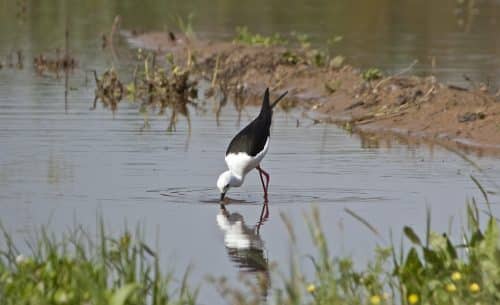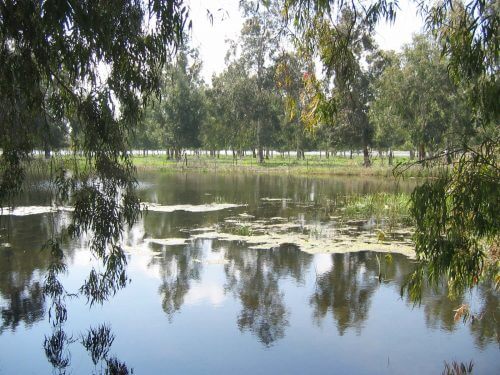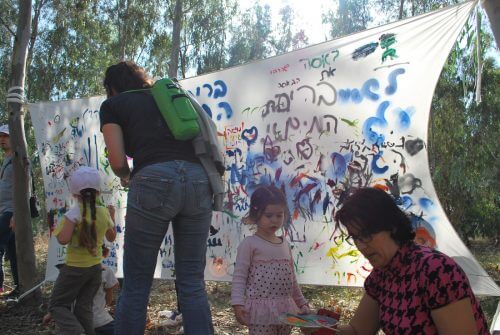The winter pools are more than a convenient option for a fun winter trip within walking or pedaling distance from home. They have an important role in preventing flooding and flooding, in improving the quality of groundwater and as a unique habitat for a variety of animals. Visit them before they disappear completely

By Daniel Mayer, Angle, Science and Environment News Agency
Rehovot's winter pool was called "Habasa" (egg in Arabic) and as children it was for us the perfect kingdom for frolics and adventures. In the winter, when the pool was full, we would come back from it with clothes dirty with mud and a smile on our faces. In the summer, the pool would dry up and the water and mud would be replaced by colorful carpets of anemones, poppies and sedums.
In the years that have passed since then, Bassa has become such a distant memory that this past weekend it almost completely disappeared from my mind. I found myself getting lost between the seat of Yishresh and the city of my childhood, which in the meantime had already expanded and swallowed almost all that was left of the orchards and fields adjacent to the city. Only after much effort did I finally manage to reach the familiar eucalyptus grove. The sounds of the frogs, the reed plants and the ancient sycamore trees managed to forget for a moment the hustle and bustle of the city, but the pond itself seemed to me like a scaled-down version of the vast swamp I remembered.
Now, the winter pool of my childhood is in danger. Real estate developers want to build a new neighborhood on it, which will not only cover my childhood memories with concrete, but may also significantly damage the services that the winter pool provides to the residents of the area and the animals that have made it their home.
A winter pool is defined in the professional language as a moist habitat (which is defined as an area that is flooded with water seasonally or throughout the year). On February 2, the world celebrated International Wetlands Day and this year the emphasis on this day is on the way wetlands enable the areas where they are found to deal with natural disasters.
It was announced on the website of the global RAMSAR organization that the frequency of natural disasters around the world has more than doubled over the past 35 years, following climate change which has caused extreme weather events - floods, cyclones and droughts. Between 1996 and 2015, about 1.35 million people perished as a result from extreme climate events, and in 90 percent of the cases natural disasters are related to water. The bad news is that the frequency and intensity of these events will only increase over the years.
minimize damage
The humid habitats are a natural barrier against natural disasters in a variety of ways. The humid habitat sometimes acts like a natural sponge, which stores the rainfall and reduces flooding. During the dry periods the habitat releases the stored water and thus delays the onset of drought and water shortage. When wetland habitats are properly maintained, they can strengthen communities and help them cope with and recover from extreme flooding or drought events.
One of the most important moist habitats in Israel are the winter pools. More than 1,200 winter pools existed until 1948 and now 95 percent (!) of them no longer exist (according to Mendelsohn's research from the mid-80s). The Hadera area, for example, which was full of swamps that dried up and turned into seasonal winter pools, today is mostly paved with asphalt. One of the effects of this wholeness of concrete and cement is rediscovered every year when Roads are blocked and vehicles are damaged as a result of the flooding.

Prevention of floods and restoration after them is not the only advantage of the winter pool. "Besides helping to drain areas, the winter pools are a focus for gathering Water birds, water insects and amphibians", says Alon Ziv, winter pool conservation coordinator at the Society for the Protection of Nature. "The pools also encourage oxygen production and contribute to the quality and quantity of groundwater." In addition, the pools also have symbolic and value importance in their very presence in the urban environment. Most of the ponds are located between Gedera and Hadera, in the largest settlement area in the country, and this fact makes them a bastion of urban nature, which allows the residents of the cities to go out into nature on foot, or by bicycle, without needing a car to travel to a nature reserve in the north or south.
And what happens to the winter pools when summer comes? In the dry and hot season, the pond dries up and the plants and animals prepare accordingly: the nymphs climb the trees, the burrowers (an amphibian that resembles a frog) burrow under the ground and the crabs create viable eggs (eggs coated with a thick coat that protects against heat and dehydration) that sink to the bottom and are stored in a bottom "warehouse" The dry pool.
This stage is an important and critical stage for the winter pools. The bustling basin looks arid and deserted in the summer. Travelers turn to recreation at the seaside, and this is the time when contractors and those with real estate interests begin to turn their eyes to the "empty" area and the war to preserve this important piece of nature begins anew.
Habitat is disappearing
In Israel today only 5 percent of the winter pools that existed at the time of the establishment of the state remain. In the past, the ponds and swamps of Israel were dried up in order to exterminate the malaria disease. Malaria has long since been curbed, but winter pools continue to disappear, often in favor of buildings and roads. The work of protecting the winter pools is difficult and Sisyphean, and often the people of the environment find themselves discriminated against and severely disappointed. "In 2015, the train depot pool, one of the most important pools in the Hadera area, was completely destroyed in the midst of a construction project," says Ziv. "In 2016, the Petach Tikva pool was damaged when a contractor dumped dirt waste into it. 2017 has only just begun, but already Ashkelon's winter pool is facing almost total destruction because it is planned to become an 'eco-park' of extreme sports. According to the plans, the pool will be reduced from 190 dunams to only 50 dunams."
Among the multitude of reasons for concern, there is also positive news. Due to the accelerated rate of disappearance of the winter ponds in Israel and the dwindling of species of animals and plants unique to this habitat, there is a trend leading entities such as the Society for the Protection of Nature and the Nature and Parks Authority to dig artificial winter ponds in various parts of the country, such as the impressive winter pond in the Green Village, near the Levinsky Seminary in the north of Tel Aviv. A, in Herzliya and many other places. The preparation of the artificial pool is also accompanied by the "adoption" of the new winter pool by the nearby community, activities for the whole family and preservation of nature and the environment in the area.

About two months ago, the Nature and Parks Authority announced that the winter pool in Rehovot (also called Jorat Ar-Ramla) is intended to become a nature reserve. "The Rehovot Pool is one of the oldest and most important winter pools on the coastal plain," reads the authority's official publication. "The pond serves as a prominent breeding site for one of the few populations of the digger found in the southern coastal plain... The protection of the Rehovot winter pond is necessary to preserve the biological diversity in the southern coastal plain and the recommendation is to set it as the highest priority for conservation."
The preservation of winter pools and organisms that are in danger of global extinction is an obligation of the State of Israel, which is a signatory to the Rio Convention for the Conservation of Biological Diversity (CBD) and the RAMSAR Convention for the Conservation of Wetland Habitats.
protect the drainage basin
"One day I was walking with my friend in the fields near Rehovot and suddenly I saw an egg that I didn't know before," says Yuval Shipris, a resident of Rehovot, how he was first exposed to the winter pool in his city. "After that, in 2010, I saw that in the master plan of the city they were planning to build in the east of the city, which could have damaged the winter pool." Together with other activists, Shipris founded the association "street spaces", which works voluntarily to preserve the pool area. "Every city has its own uniqueness. In Rehovot we have the areas to the east of the city, with the ancient buildings, the white acacia trees, the open spaces and the winter pool. You can treat this whole space as a natural and cool amusement park, and you can build towers there - we preferred the first option."
Shipris and his friends fear that declaring the pool a nature reserve will not save the pool, because according to the city's master plans, thousands of housing units are expected to be built around the pool. "In order to protect the winter pool, it is not enough to maintain it, you have to protect the entire drainage basin," says Shipris. "That's the only way you get a pool full of water and clean of pollutants." In fact, the winter pools, being the lowest points in the drainage basin, naturally drain excess water from large areas that used to be open areas, but are now covered with concrete and cement that covers the areas around the pool. This leads to the fact that the pool not only drains water, but also fuels, oils and various pollutants that are washed into the pools by the rains, threatening to damage the delicate balance of the animals in the pool.
so what are we doing? First of all, we celebrate. Since 2010, the Rehovot Area Association has been holding an annual event at the winter pool. "This year this event is more important than ever," says Shipris. "That's why, on March 18, we invite everyone who wants to celebrate nature to a festive event at the winter pool, which will mark the starting point for our successful fight to save the pool," says Shipris.

4 תגובות
The article ends with an invitation: "On March 18, we invite everyone who wants to celebrate nature to a festive event at the winter pool." Too bad it wasn't posted last week!
It should have been: "Drying is better than the mosquito".
Again and again my father proves that he is an "expert in everything"
And as such he has something to respond to almost every article and every topic,
For the body of the response here:
Winter pools are not a source of mosquitoes since it is cold in winter and the mosquitoes (Anopheles) are not active,
Those that are active are eaten by frog tadpoles and toads,
Our "ancestors" (including the Romans) drained marshes with Nicosen, not with eucalyptus.
An Asiatic tiger is an Asian tiger and not an "Asian tiger",
The people of the Ministry of Health understand nature about as much as - - - my father.
Therefore, the "conflict" is resolved out of understanding and knowledge
And not by the personal preferences of our people!
And what do we do with the mosquitoes that also like winter pools - because there are no fish there that eat them?
In our childhood, we were taught that swamps and puddles bring mosquitoes and mosquitoes bring malaria, so our ancestors drained swamps and puddles and planted the eucalyptus in Hadera against the swamp.
Even today we are warned about the Asian tiger mosquito that transmits the Nile fever disease...
And what about the advertisement of the Ministry of Health "There are no mosquitoes in dry places"...
And we don't want mosquito repellent sprays either...
So there is a conflict between wanting to maintain the health of the residents and maintaining the beauty of these puddles.
So personally I prefer the drying over the alternative.